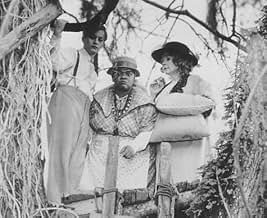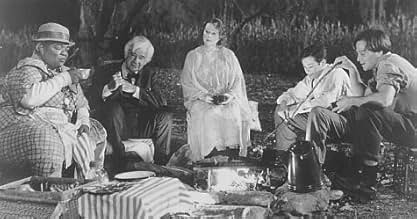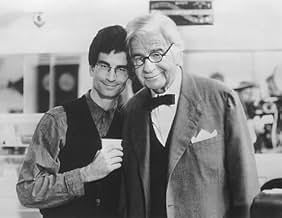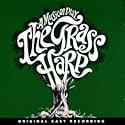Ajouter une intrigue dans votre langueBecoming an orphan in 1935, Collin moves to his dad's cousins Verena and Dolly. Verena is a rich, bossy businesswoman. Dolly, Collin and the maid revolt, moving to a tree house.Becoming an orphan in 1935, Collin moves to his dad's cousins Verena and Dolly. Verena is a rich, bossy businesswoman. Dolly, Collin and the maid revolt, moving to a tree house.Becoming an orphan in 1935, Collin moves to his dad's cousins Verena and Dolly. Verena is a rich, bossy businesswoman. Dolly, Collin and the maid revolt, moving to a tree house.
- Réalisation
- Scénario
- Casting principal
- Récompenses
- 3 victoires au total
Avis à la une
As the story begins in a prologue set in 1935, a young boy (Edward Furlong) is sent to live with his two spinster aunts following the death of his parents. These aunts might be sisters, but they are decidedly different; one is a hard-nosed businesswoman who owns many of the shops in town (Sissy Spacek), the other (Piper Laurie) is gentle and childlike, keeps house, and makes a homeopathic dropsy cure. After a few years pass, the two sisters have a falling out over taking the homeopathic cure into a factory setting, Laurie, Furlong, and maid Nell Carter decamp to the woods while waiting for Spacek to change her mind.
That is the main thrust of the plot, but there are all sorts of familiar faces in here as well: Walter Matthau as a retired judge and suitor for Laurie, Mary Steenburgen as a tent revivalist with 15 children, and brief cameos from the likes of Jack Lemmon, Roddy McDowell, Charles Durning, Scott Wilson, and Doris Roberts. This film is very little known, but it's worth tracking down for Laurie's performance especially.
Walter Matthau is retired Judge Cool, a sensible elderly man who "good" people consider a nut (he openly admits that there was nothing wrong with a true love affair between a white man and an African-American woman which led to the white man being run out of town). Matthau is having problems in his home with an unsympathetic grown son and the son's wife. Matthau's wife has died years before. Others in this well cast film include Jack Lemmon as a Dr. Ritt from Chicago, whom Spacek brings back home - and whom accidentally sets in motion the delayed rebellion of Laurie and the others against Spacek's stiff and respectable regime. Joe Don Baker plays the local chicken rancher/part-time sheriff (who hates having to cow-tow to Spacek). Charles Durning is the local minister, who is out for only respectable religious leaders (with Bonnie Bartlett as his equally stuffy wife). Mary Steenburgen is the religious threat - an unmarried mother of twelve who has a mobile revival tent in the back country, but whom is pretty likable for all one's questions about her revivalism. Sean Patrick Flannery is Riley, a young man who lives unconventionally, but whom turns out to be a pretty good friend to Collin. Roddy McDowall (in one of his last roles) plays Amos, the local barber.
Basically Capote uses his characters to punch holes in what "nice, conventional" small town people believe is proper behavior. Spacek is the leader of these people, who believe in organized Christianity, hard work and business, and straight-laced morality. Laurie, Matthau, Carter, Flannery, Steenburgen, and Furlong are all believers in doing what is natural, and from the heart. So as they begin working together they become a model and a danger for the "nice people". But as the tale progresses, the nice people find that what they believe in does not emotionally satisfy them. Indeed Spacek suffers several losses in the course of the film that she never expected.
Charles Matthau, Walter's son, directed this (very nicely - it is one of the best ensemble movies of recent years). It was also a rarity in the 1990s decade of Matthau-Lemmon films. Whereas GRUMPY OLD MEN, GRUMPIER OLD MEN, OUT TO SEA, and THE ODD COUPLE II were all comedies, this film is dramatic and the two actors only shared one scene (with Roddy McDowall in his barber shop) in the film. Also, Lemmon's character is less likable than usual in this film.
The title, by the way, refers to a statement by Laurie's character about how the grass gives off a music like a harp, which is actually the voices of all the people who ever inhabited the earth. It becomes a running metaphor in the film up to the conclusion.
Having said that, the one criticism I have of the movie is that I didn't really CARE about the characters. I enjoyed very much watching the characters interact, and being reminded of life in a world that has almost completely disappeared. But I was more amused by them than passionate about them.
While this film may not be perfect, it's a wonderful movie; more intelligent than at least 90% of what comes out of Hollywood. As another reviewer suggested, if you have a couple of hours of quiet time, sit down with a glass of wine and enjoy.
Le saviez-vous
- AnecdotesIn "Carrie" (1976), Piper Laurie and Sissy Spacek played mother and daughter, respectively. Here, they play sisters.
- GaffesWhen the men fall out the treehouse and land on the ground, the leaves slide in a large square revealing the crash pad.
- Citations
Mrs. Peters: Shame on you Dolly Talbo, sittin up in that tree like a drunken Indian, smoking on cigarettes like a common... Floozy
Mrs. Buster: Floozy
Catherine Creek: Preacher lady don't you be callin Ms. Dolly here no floozy now, why I come down there and slap you bow-legged.
- ConnexionsReferenced in Walter Matthau: Diamond in the Rough (1997)
- Bandes originalesRock of Ages
Written by Augustus Montague Toplady, Thomas Hastings
Performed by Bonnie Bartlett, Charles Durning
Meilleurs choix
- How long is The Grass Harp?Alimenté par Alexa
Détails
- Date de sortie
- Pays d’origine
- Site officiel
- Langue
- Aussi connu sous le nom de
- Çimen Türküsü
- Lieux de tournage
- Sociétés de production
- Voir plus de crédits d'entreprise sur IMDbPro
Box-office
- Budget
- 8 000 000 $US (estimé)
- Montant brut aux États-Unis et au Canada
- 559 771 $US
- Week-end de sortie aux États-Unis et au Canada
- 117 161 $US
- 13 oct. 1996
- Montant brut mondial
- 559 771 $US
- Durée1 heure 47 minutes
- Couleur
- Mixage
- Rapport de forme
- 1.85 : 1
Contribuer à cette page





































